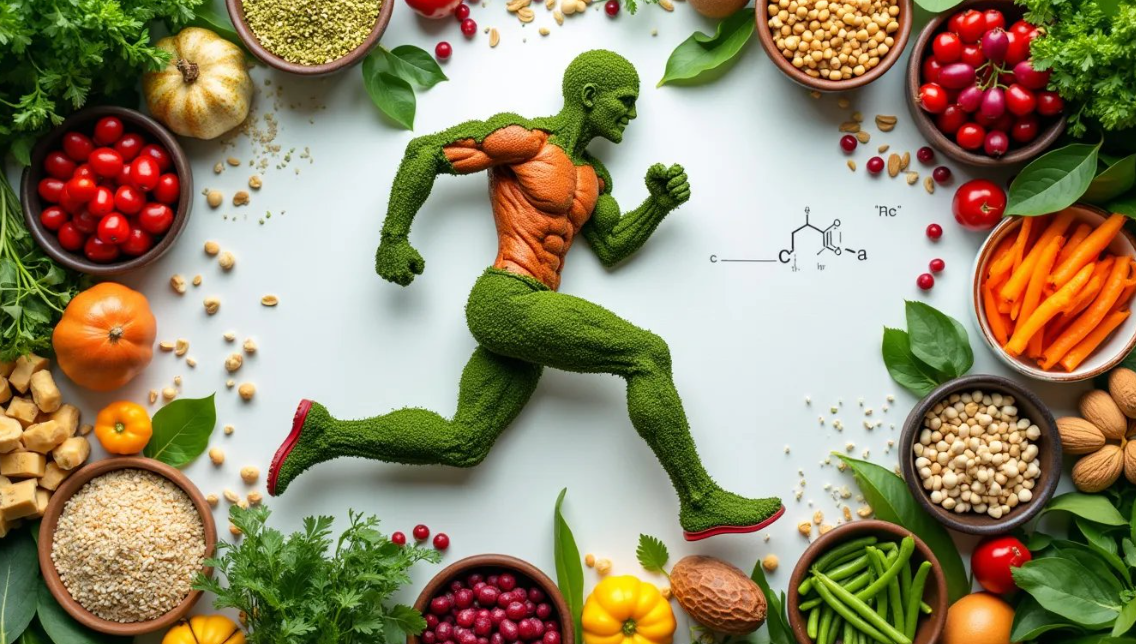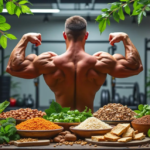Did you know that some of the world’s top athletes, including ultramarathoner Scott Jurek and tennis champion Venus Williams, thrive on plant-based diets? As more athletes turn to plant-based nutrition, understanding the role of complete proteins becomes crucial for maintaining peak performance. In this comprehensive guide, we’ll explore everything you need to know about complete proteins for plant-based athletes in 2024.
Understanding Complete Proteins for Plant-Based Athletes
Complete proteins are protein sources that contain all nine essential amino acids in adequate proportions. These amino acids are crucial for muscle repair, recovery, and overall performance in athletes.
Why Are Complete Proteins Crucial for Plant-Based Athletes?
Athletes following a vegan or vegetarian diet have higher protein requirements than the general population due to increased muscle breakdown during intense training. Complete proteins provide all the building blocks necessary for muscle repair and growth in a single food source.
A study published in the Journal of the International Society of Sports Nutrition found that plant-based athletes can meet their protein needs through a well-planned diet, but special attention must be paid to the quality and quantity of protein sources [1].
Top Sources of Complete Proteins for Plant-Based Athletes
- Quinoa
- Soy products (tofu, tempeh, edamame)
- Buckwheat
- Hemp seeds
- Chia seeds
- Spirulina
Each of these sources provides a complete amino acid profile, making them excellent choices for plant-based athletes looking to optimize their protein intake.
Combining Incomplete Proteins for Optimal Nutrition
While some plant-based foods are complete proteins, many are incomplete. By combining different protein sources throughout the day, you can ensure you’re getting all essential amino acids.
Examples of Complementary Protein Pairs
- Rice and beans
- Whole grain bread and nut butter
- Hummus and whole wheat pita
Protein Requirements for Plant-Based Athletes
Protein needs vary depending on the type and intensity of athletic activity:
- Endurance athletes: 1.2 to 1.4 grams of protein per kg of body weight per day
- Strength athletes: 1.4 to 2.0 grams of protein per kg of body weight per day
- Team sport athletes: 1.2 to 1.7 grams of protein per kg of body weight per day
These recommendations are supported by research published in the International Journal of Sport Nutrition and Exercise Metabolism, which found that plant-based athletes may need to consume slightly more protein than their omnivorous counterparts to account for the lower digestibility of plant proteins [2].
Benefits of Plant-Based Proteins for Athletic Performance
Plant-based proteins offer numerous benefits for athletes, including:
- Reduced inflammation and faster recovery
- Improved cardiovascular health
- Enhanced endurance and stamina
- Better digestion and nutrient absorption
- Environmental benefits
For more information on the overall benefits of plant-based nutrition for athletes, check out our guide on Plant-Based Nutrition for Athletes.
Supplementation Strategies for Plant-Based Athletes
While it’s possible to meet protein needs through whole foods, some athletes may benefit from supplements. For more information on this topic, check out our comprehensive guide on vegan protein supplements.
Types of Vegan Protein Supplements
- Pea Protein
- Rice Protein
- Hemp Protein
- Blended Plant Proteins
Meal Planning for Optimal Protein Intake
Here’s a sample meal plan for a plant-based endurance athlete:
- Breakfast: Tofu scramble with vegetables, whole grain toast, and avocado
- Snack: Smoothie with plant-based protein powder, banana, and spinach
- Lunch: Quinoa and black bean bowl with mixed vegetables and tahini dressing
- Pre-workout snack: Apple slices with almond butter
- Post-workout: Plant-based protein shake
- Dinner: Lentil and vegetable curry with brown rice
- Evening snack: Greek-style vegan yogurt with mixed berries and hemp seeds
For more innovative plant-based protein options, explore our article on Plant-Based Protein Innovations.
Comparing Plant-Based and Animal-Based Proteins for Athletes
| Aspect | Plant-Based Proteins | Animal-Based Proteins |
|---|---|---|
| Complete Protein Sources | Quinoa, soy, hemp seeds, chia seeds, spirulina | Meat, fish, eggs, dairy |
| Protein Digestibility | Generally lower | Generally higher |
| Fiber Content | High | Low or none |
| Cholesterol | None | Present in most sources |
| Environmental Impact | Lower | Higher |
Conclusion
Obtaining complete proteins on a plant-based diet is not only possible but can also enhance your athletic performance. By incorporating a variety of protein-rich plant foods, properly timing your intake, and supplementing when necessary, you can meet your protein needs and thrive as a plant-based athlete.
Start incorporating these complete plant proteins into your diet and experience the difference in your athletic performance! Remember, every body is different, so listen to yours and consult with a sports nutritionist to fine-tune your plant-based athletic diet.
Key Takeaways
- Complete proteins contain all nine essential amino acids and are crucial for muscle repair and growth in athletes.
- Excellent plant-based sources of complete proteins include quinoa, soy products, buckwheat, hemp seeds, chia seeds, and spirulina.
- Combining incomplete protein sources throughout the day can provide all necessary amino acids.
- Plant-based athletes may need slightly higher protein intake (1.2-2.0 g/kg of body weight) depending on their sport and training intensity.
- Proper timing of protein intake (before, during, and after workouts) is important for optimal performance and recovery.
- Plant-based proteins offer additional benefits such as higher fiber content, antioxidants, and lower environmental impact.
- Supplementation may be beneficial for some plant-based athletes, especially for nutrients like vitamin B12, vitamin D, iron, and zinc.
Frequently Asked Questions
Can I really get enough protein on a plant-based diet as an athlete?
Absolutely! With proper planning and food choices, plant-based athletes can easily meet their protein needs. Focus on incorporating a variety of protein-rich plant foods like legumes, whole grains, nuts, seeds, and plant-based protein powders if needed.
Do I need to combine proteins at every meal?
No, it’s not necessary to combine proteins at every meal. Your body maintains an amino acid pool throughout the day, so as long as you’re eating a variety of plant proteins over the course of the day, you’ll likely get all the essential amino acids you need.
What’s the best plant-based protein powder for athletes?
The “best” protein powder can vary depending on individual needs and preferences. However, many athletes find success with blended plant proteins that combine sources like pea, rice, and hemp to provide a complete amino acid profile. Look for products that are third-party tested and have a good amino acid profile, particularly rich in leucine.
How can I increase my protein intake without relying on supplements?
Focus on incorporating protein-rich whole foods into each meal. Add legumes to salads and soups, use quinoa as a base for bowls, snack on nuts and seeds, and experiment with tofu and tempeh in various dishes. Also, don’t overlook the protein content in vegetables like broccoli, spinach, and Brussels sprouts.
Are plant-based proteins as effective as animal proteins for muscle building?
Recent studies have shown that plant-based proteins can be just as effective as animal proteins for muscle building when consumed in adequate amounts. While some plant proteins may have a slightly lower leucine content, this can be overcome by slightly increasing overall protein intake or focusing on leucine-rich plant sources like soy and pea protein.
References
- Rogerson, D. (2017). Vegan diets: practical advice for athletes and exercisers. Journal of the International Society of Sports Nutrition, 14, 36.
- Cintineo, H. P., Arent, M. A., Antonio, J., & Arent, S. M. (2018). Effects of Protein Supplementation on Performance and Recovery in Resistance and Endurance Training. Frontiers in Nutrition, 5, 83.
- Barnard, N. D., Goldman, D. M., Loomis, J. F., Kahleova, H., Levin, S. M., Neabore, S., & Batts, T. C. (2019). Plant-Based Diets for Cardiovascular Safety and Performance in Endurance Sports. Nutrients, 11(1), 130.



